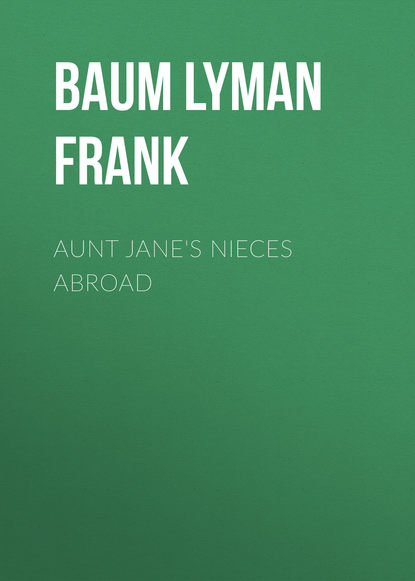По всем вопросам обращайтесь на: info@litportal.ru
(©) 2003-2024.
✖
Aunt Jane's Nieces Abroad
Настройки чтения
Размер шрифта
Высота строк
Поля
CHAPTER XXVII
TATO IS ADOPTED
They canvassed the subject of their future travels with considerable earnestness. Uncle John was bent upon getting to Rome and Venice, and from there to Paris, and the nieces were willing to go anywhere he preferred, as they were sure to enjoy every day of their trip in the old world. But Mr. Watson urged them strongly to visit Syracuse, since they were not likely to return to Sicily again and the most famous of all the ancient historic capitals was only a few hours' journey from Taormina. So it was finally decided to pass a week in Syracuse before returning to the continent, and preparations were at once begun for their departure.
Kenneth pleaded for one more day in which to finish his picture of Etna, and this was allowed him. Uncle John nevertheless confessed to being uneasy as long as they remained on the scene of his recent exciting experiences. Mr. Watson advised them all not to stray far from the hotel, as there was no certainty that Il Duca would not make another attempt to entrap them, or at least to be revenged for their escape from his clutches.
On the afternoon of the next day, however, they were startled by a call from the Duke in person. He was dressed in his usual faded velvet costume and came to them leading by the hand a beautiful little girl.
The nieces gazed at the child in astonishment.
Tato wore a gray cloth gown, ill-fitting and of coarse material; but no costume could destroy the fairy-like perfection of her form or the daintiness of her exquisite features. With downcast eyes and a troubled expression she stood modestly before them until Patsy caught her rapturously in her arms and covered her face with kisses.
"You lovely, lovely thing!" she cried. "I'm so glad to see you again, Tato darling!"
The Duke's stern features softened. He sighed heavily and accepted Uncle John's polite invitation to be seated.
The little party of Americans was fairly astounded by this unexpected visit. Kenneth regretted that he had left his revolver upstairs, but the others remembered that the brigand would not dare to molest them in the security of the hotel grounds, and were more curious than afraid.
Il Duca's hand was wrapped in a bandage, but the damaged finger did not seem to affect him seriously. Beth could not take her eyes off this dreadful evidence of her late conflict, and stared at it as if the bandage fascinated her.
"Signore," said the Duke, addressing Uncle John especially, "I owe to you my apologies and my excuses for the annoyance I have caused to you and your friends. I have the explanation, if you will so kindly permit me."
"Fire away, Duke," was the response.
"Signore, I unfortunately come of a race of brigands. For centuries my family has been lawless and it was natural that by education I, too, should become a brigand. In my youth my father was killed in an affray and my mother took his place, seizing many prisoners and exacting from them ransom. My mother you have seen, and you know of her sudden madness and of her death. She was always mad, I think, and by nature a fiend. She urged my elder brother to wicked crimes, and when he rebelled she herself cast him, in a fit of anger, into the pit. I became duke in his place, and did my mother's bidding because I feared to oppose her. But for years I have longed to abandon the life and have done with crime.
"With me our race ends, for I have no sons. But my one child, whom you know as Tato, I love dearly. My greatest wish is to see her happy. The last few days have changed the fortunes of us both. The Duchessa is gone, and at last I am the master of my own fate. As for Tato, she has been charmed by the young American signorini, and longs to be like them. So we come to ask that you forgive the wrong we did you, and that you will now allow us to be your friends."
Uncle John was amazed.
"You have decided to reform, Duke?" he asked.
"Yes, signore. Not alone for Tato's sake, but because I loathe the life of brigandage. See; here is my thought. At once I will disband my men and send them away. My household effects I will sell, and then abandon the valley forever. Tato and I have some money, enough to live in quiet in some other land, where we shall be unknown."
"A very good idea, Duke."
"But from my respect for you, Signer Merreek, and from my daughter's love for your nieces – the brave and beautiful signorini – I shall dare to ask from you a favor. But already I am aware that we do not deserve it."
"What is it, sir?"
"That you take my Tato to keep for a few weeks, until I can send away my men and arrange my affairs here. It would be unpleasant for the child here, and with you she will be so happy. I would like the sweet signorini to buy nice dresses, like those they themselves wear, for my little girl, and to teach her the good manners she could not gain as the brigand's daughter. Tato has the money to pay for everything but the kindness, if you will let her stay in your society until I can claim her. I am aware that I ask too much; but the Signorina Patsy has said to my child that they would always be friends, whatever might happen, and as I know you to be generous I have dared to come to you with this request. I only ask your friendship for my Tato, who is innocent. For myself, after I have become a good man, then perhaps you will forgive me, too."
Uncle John looked thoughtful; the old lawyer was grave and listened silently. Patsy, her arms still around the shrinking form of the child, looked pleadingly at her uncle. Beth's eyes were moist and Louise smiled encouragingly.
"Well, my dears? The Duke is certainly not entitled to our friendship, as he truly says; but I have nothing against little Tato. What do you advise?"
"Let us keep her, and dress her like the beautiful doll she is, and love her!" cried Patsy.
"She shall be our adopted cousin," said Louise.
"Tato is good stuff!" declared Kenneth.
"Well, Beth?"
"It seems to me, Uncle," said the girl, seriously, "that if the Duke really wishes to reform, we should give him a helping hand. The little girl has led a bad life only because her father forced her to lure his victims and then procure the money for their ransoms; but I am sure her nature is sweet and pure, and she is so young that she will soon forget the evil things she has learned. So I vote with my cousins. Let us adopt Tato, and care for her until her father can introduce her into a new and more proper life."
"Well argued, Beth," said Uncle John, approvingly. "I couldn't have put the case better myself. What do you say, Silas Watson?"
"That you are all quite right," answered the old lawyer. "And the best part of the whole thing, to me, is the fact that this nest of brigands will be wiped out of existence, and Taormina be hereafter as safe for tourists as old Elmhurst itself. I wish I could say as much for the rest of Sicily."
Uncle John extended his hand to the Duke, who took it gratefully, although with a shamefaced expression that was perhaps natural under the circumstances.
"Look up, dear," said Patsy to the girl, softly; "look up and kiss me. You've been adopted, Tato! Are you glad?"
CHAPTER XXVIII
DREAMS AND DRESS-MAKING
Tato was now one of the family. They left Taormina the next day, and Frascatti drove all the girls in his victoria to the station.
"You must come again, signorini," said he, looking regretful at their departure. "Next year the fountain of the ice cream soda will be in operation, like those you have in Chicago, which is America. Our culture increases with our civilization. It is even hinted that Il Duca is to abandon our island forever. He has been interesting to us, but not popular, and you will not miss him when you come again to find he is not here. If this time he has caused you an inconvenience, I am sorry. It is regrettable, but, – "
"But it is so!" said Patsy, laughing.
Tato was again transformed. Patricia, who was the smallest of the three nieces, though not especially slim, had quickly altered one of her own pretty white gowns to fit the child, and as she was deft with her needle and the others had enthusiastically assisted her, Tato now looked more like a fairy than ever.
It was really wonderful what a suitable dress could do for the tiny Sicilian maid. She had lost her free and boyish manner and become shy and retiring with strangers, although when in the society of the three nieces she was as sweet and frank as ever. She wore her new gown gracefully, too, as if well accustomed to feminine attire all her life. The only thing now needed, as Patsy said, was time in which to grow her hair, which had always been cut short, in boyish fashion.
They were a merry party when they boarded the train for Syracuse, and Uncle John arranged with the guard to secure two adjoining compartments all to themselves, that they might have plenty of room.
"Where did you put the money, Uncle John?" Beth whispered, when at last they were whirling along and skirting the base of Mt. Etna toward the Catania side.
"I've hidden it in my trunk," he replied, in the same confidential tone. "There is no bank in this neighborhood to receive it, so I decided to carry it with us."
"But will it be safe in the trunk?" she enquired.
"Of course, my dear. Who would think of looking there for fifty thousand dollars? And no one knows we happen to have so much money with us."
"What did the Count – I mean, Mr. Weldon – do with his ransom?"
"Carries it in his satchel, so he can keep it with him and have an eye on it. It's a great mistake, Beth, to do such a thing as that. It'll make him uneasy every minute, and he won't dare to let a facchino handle his grip. But in my case, on the other hand, I know it's somewhere in the baggage car, so I don't have to worry."
The journey was a delightful one. The road skirted the coast through the oldest and most picturesque part of Sicily, and it amazed them to observe that however far they travelled Etna was always apparently next door, and within reaching distance.
At Aci Castello they were pointed out the seven Isles of the Cyclops, which the blind Polyphemus once hurled after the crafty Ulysses. Then they came to Catania, which is the second largest city in Sicily, but has little of historic interest. Here they were really at the nearest point to the mighty volcano, but did not realize it because it always seemed to be near them. Eighteen miles farther they passed Leontinoi, which in ancient days dared to rival Siracusa itself, and an hour later the train skirted the bay and Capo Santa Panagia and slowly came to a halt in that city which for centuries dominated all the known world and was more powerful and magnificent in its prime than Athens itself – Syracuse.
The day had become cloudy and gray and the wind whistled around them with a chill sweep as they left their coach at the station and waited for Kenneth to find carriages. Afterward they had a mile to drive to their hotel; for instead of stopping in the modern town Uncle John had telegraphed for rooms at the Villa Politi, which is located in the ancient Achradina, at the edge of the Latomia de Cappuccini. By the time they arrived there they were blue with cold, and were glad to seek the warm rooms prepared for them and pass the remainder of the afternoon unpacking and "getting settled."

















